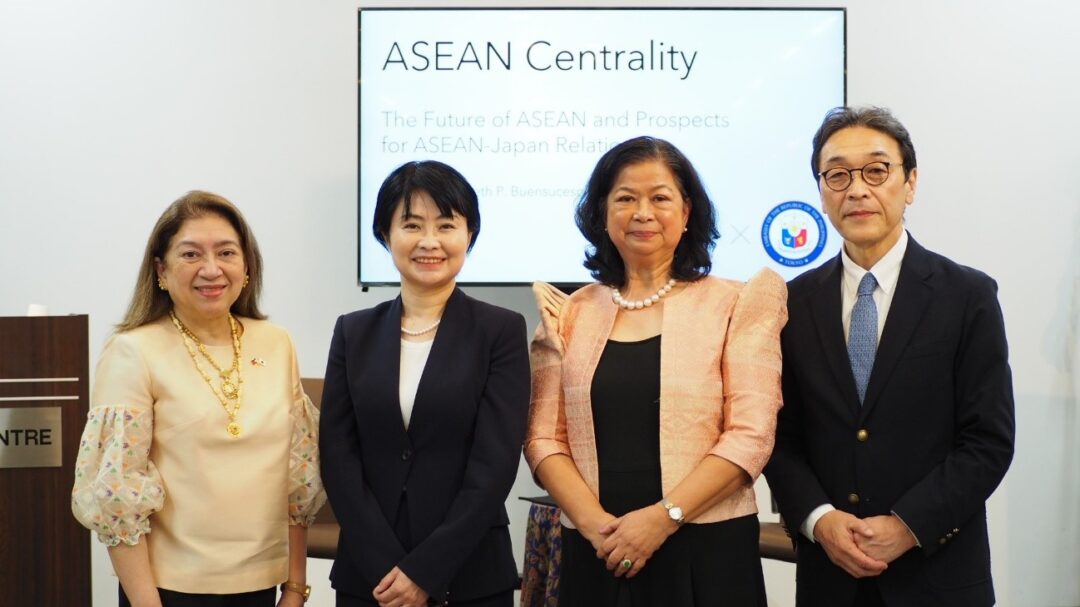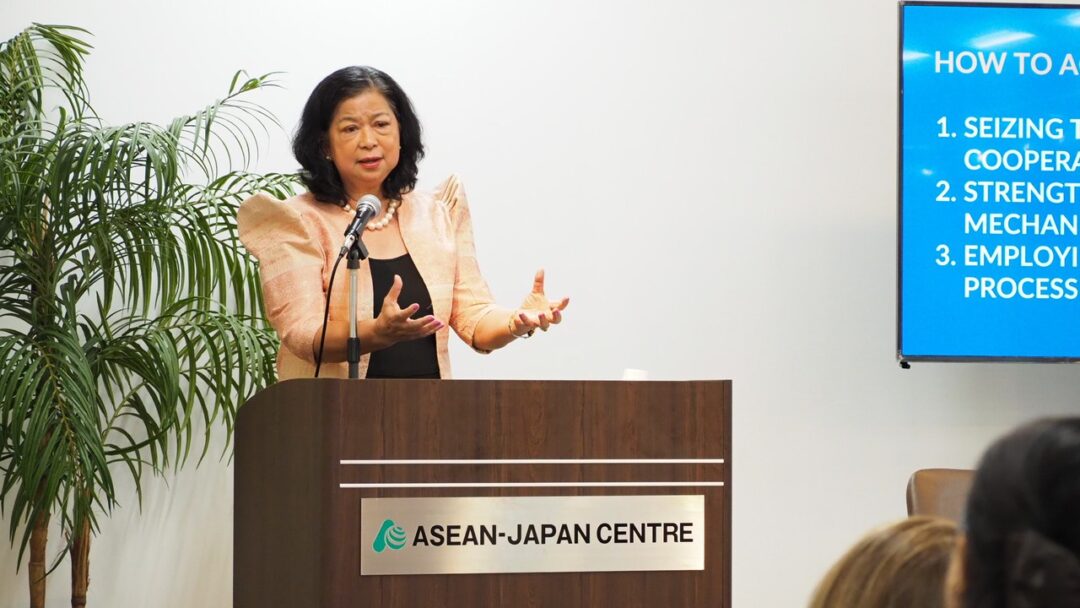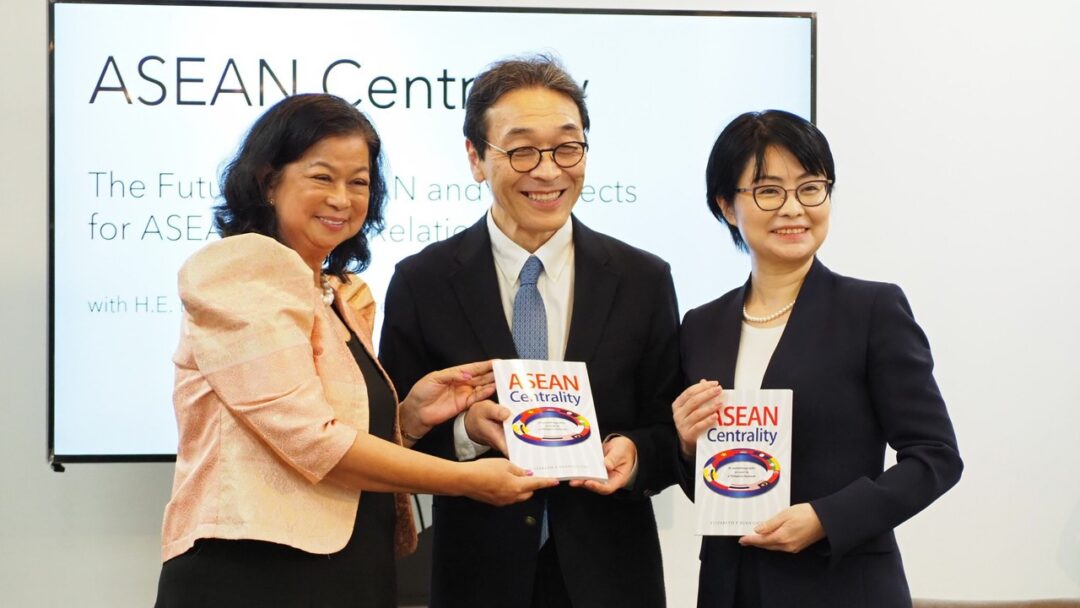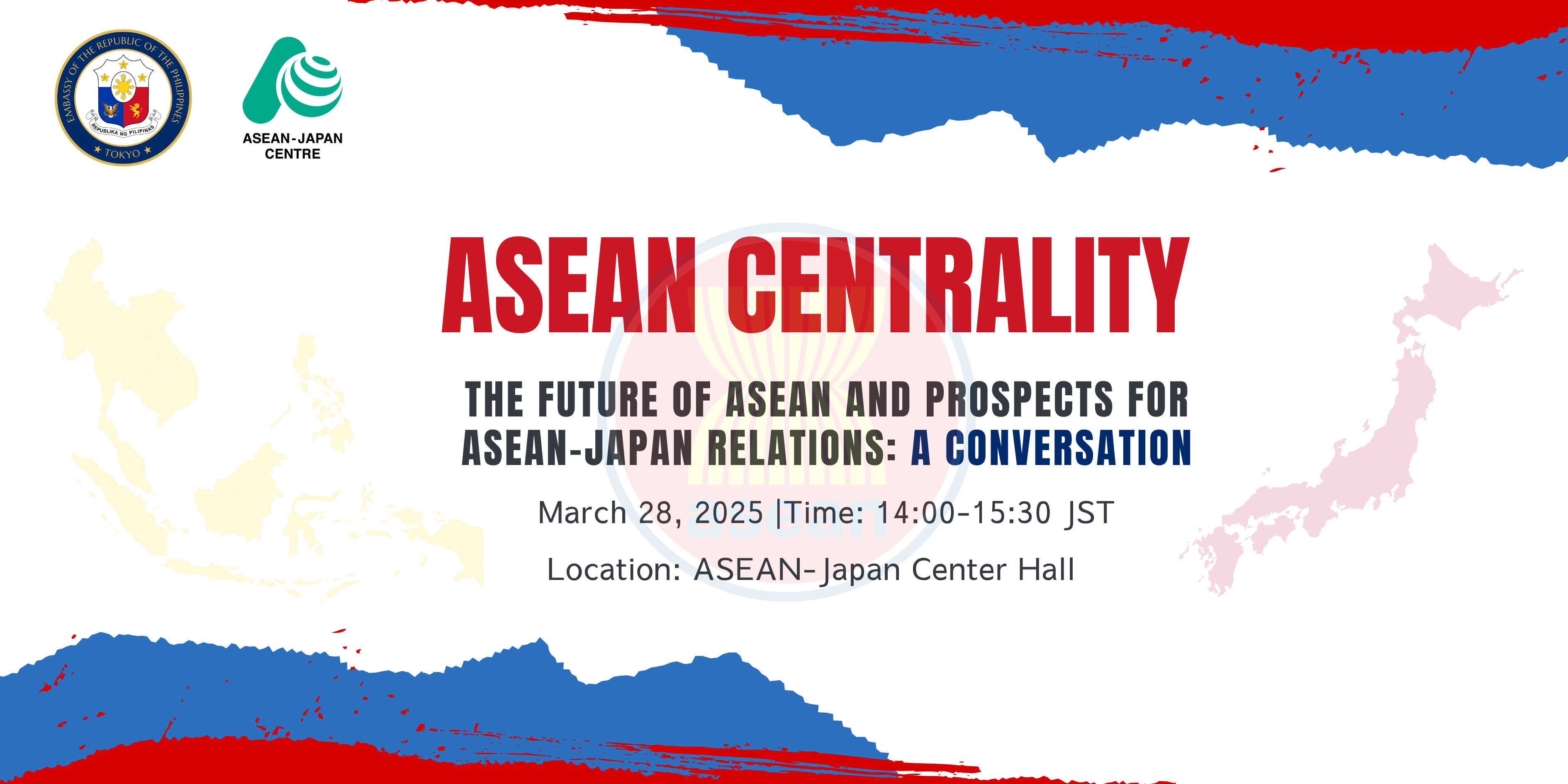The full recording of the webinar is available on YouTube.
https://youtu.be/mFqRubGgo3s
Overview:
On 28 March 2025, the Philippine Embassy in Tokyo hosted the “ASEAN Centrality, the Future of ASEAN, and Prospects for ASEAN-Japan Relations: A Conversation” symposium, in collaboration with the ASEAN-Japan Centre (AJC). The event featured a keynote speech from H.E. Elizabeth P. Buensuceso, followed by a Q&A session with Dr. Mie Oba of Kanagawa University.

The event opened with remarks from H.E. Mylene J. Garcia-Albano, the Ambassador of the Philippines to Japan. She highlighted ASEAN centrality as crucial to the region’s identity and the ASEAN Community 2025 vision. Ambassador Garcia-Albano also emphasized the importance of deepening ASEAN-Japan relations and expressed the Philippines’ gratitude for Japan’s partnership, particularly in maritime security.
Here are the main takeaways from Ambassador Buensuceso’s speech and presentation:
- The ASEAN Community Vision 2045 (ACV 2045) is set to be launched in May 2025, succeeding ACV 2025. It is designed to be dynamic, innovative, responsive, and people-centered, focusing on ASEAN as a major force in global peace and security, a major economic player, a digital and technological community, a promoter of cultural identity, and the embodiment of ASEAN Centrality.
- Ambassador Buensuceso defined ASEAN Centrality as ASEAN’s ability to deliver important achievements, especially through the office of the ASEAN Chair, by deciding the agenda, participants, language, and processes of cooperation. Achieving this involves seizing the agenda, strengthening ASEAN-led mechanisms, employing ASEAN principles, assuming a leadership role, promoting ASEAN awareness, and extending the ASEAN agenda in other forums.
- The ASEAN-Japan relations, formally established in 1977, have evolved beyond economic cooperation to include “Heart-to-Heart Diplomacy,” political security, economic-finance, and socio-cultural cooperation. Japan is a significant partner for ASEAN, being its fourth-largest trade partner and fifth-largest external source of FDI among dialogue partners in 2023.
- There exist various platforms for cooperation between ASEAN and Japan across political-security, economic, and socio-cultural pillars, including ASEAN-Japan Summits, ASEAN Plus Three, East Asia Summit, AJCEP, JENESYS, and the AHA Centre. Suggested areas for enhanced cooperation include synergies between Japan’s FOIP and ASEAN’s AOIP, maritime security, connectivity, and economic initiatives.
- Megatrends and challenges identified as crucial for ACV 2045 include digital transformation, major power rivalries, climate change, food-water-energy security, pandemics, and demographic shifts. ACV 2045’s pillars are designed to be adjustable to these ever-changing conditions.
- Youth engagement is considered vital for the realization of ACV 2045, with efforts to reach the grassroots level and involve youth through platforms like JENESYS and the ASEAN Foundation.
- Consensus remains a fundamental principle in ASEAN’s decision-making process, fostering buy-in and ownership among member states, which is seen as crucial for effective implementation of ASEAN’s goals. ASEAN prioritizes its principles and interests in its engagement with external partners.

Meanwhile, the following are some of the critical points highlighted during the Q&A session with Dr. Oba and the audience:
- Most Important Items of Cooperation and Difficult Topics for the High-Level Task Force (HLTF): Ambassador Buensuceso mentioned that while there are many areas of cooperation, the South China Sea is the most difficult issue that the HLTF has dealt with, recently reaching a full draft. Other challenging topics included women, peace, and security, and migrant workers. The difficulty stemmed not from animosity but from the commitment to address all issues thoroughly to build consensus.
- ASEAN’s Role in Great Power Rivalries: In response to concerns about escalating great power rivalries and the unpredictability of certain global powers, it was emphasized that ACV 2045 focuses on principles and frameworks rather than individual leaders. While ASEAN member states have diverse interests regarding China, the shared principle for addressing the South China Sea issue is international law (UNCLOS). ASEAN aims to ease tensions through peaceful settlement and a rules-based international order. ASEAN also views issues like the situation in Myanmar as its own affair, emphasizing the importance of internal solutions through the five-point consensus and inclusive dialogue, without external powers dictating the outcome.
- Maintaining ASEAN Unity Amidst Diverse Interests: The basis for ASEAN unity lies in national interest and the benefits derived from participating in a multilateral forum. Issues can be resolved diplomatically and peacefully, with ASEAN’s dreams and visions as the central driving force, prioritizing principles and interests over personalities.
- Japan’s Role as a “Third Party”: ASEAN countries see Japan as a potential “third party” amid great power rivalry, not just as an economic partner but as a comprehensive partner involved in all of ASEAN’s pillars. While Japan has historically been a significant source of FDI and a trade partner, ASEAN, particularly countries like the Philippines, may anticipate a more active Japanese role in defense and security, especially given Japan’s willingness to enforce a rules-based order. However, a specific pillar for priority in ASEAN-Japan cooperation cannot be definitively answered as all pillars are considered important.
- Youth Engagement in ACV 2045: The importance of grassroots participation and youth involvement in achieving the goals of ACV 2045 was highlighted. Platforms like ASEAN Youth Commissions, the ASEAN Youth Debate, JENESYS, and the ASEAN Foundation in Jakarta serve as channels for youth to contribute. There is a need to update human networks to engage the younger generation and promote better understanding of ASEAN in countries like Japan through intellectual and educational exchange.
- Institutional Strengthening: Recommendations for institutional strengthening within ASEAN were discussed, with the ASEAN Secretariat being a key focus. Enhancing the Office of the Secretary-General and increasing contributions were mentioned as important aspects.
- The Principle of Consensus: While sometimes seen negatively, consensus is considered a good principle in ASEAN as it fosters buy-in and ownership among member states, leading to better implementation of agreements. Complete consensus may not always be required, but it is essential for maintaining ASEAN’s integrity.
A book turnover followed, with Ambassador Buensuceso presenting copies of her book, ASEAN Centrality: An Autoethnographic Account by a Philippine Diplomat, to the AJC and Dr. Mie Oba. The book offers a unique and insightful perspective on ASEAN diplomacy, combining Ambassador Buensuceso’s personal experiences with her academic expertise. It provides a deep understanding of ASEAN Centrality as a foundational element of regional diplomacy, shedding light on its critical role in shaping the region’s dynamics.

The event concluded with closing remarks from AJC Secretary General Kunihiko Hirabayashi, who acknowledged the complexity of the topic discussed. He commended Buensuceso for simplifying the subject matter, making it easier for the audience to understand. Hirabayashi emphasized that Philippine wisdom is deeply rooted in empathy, noting that while people may have different perspectives, uniting them through inclusivity can become a powerful strength. He underscored that inclusivity is a central theme, particularly in the context of digitalization, which he described as a critical pathway to achieving a more peaceful and harmonious world.


